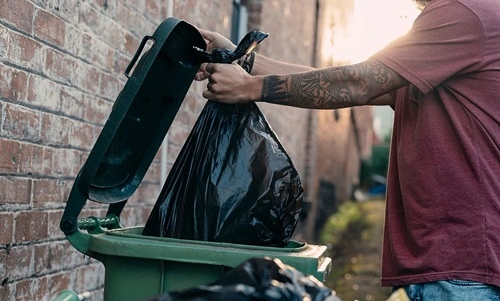No, in most cases, it is not illegal to go through someone’s trash if it has been placed on public property, such as a curb for collection. The U.S. Supreme Court has ruled in California v. Greenwood (1988) that individuals do not have a reasonable expectation of privacy for items discarded in public spaces. However, local laws and specific circumstances, such as trespassing or theft of private property, can make trash diving illegal in certain situations.
Legal Basis for Trash Picking
1. California v. Greenwood
- In this landmark case, the Supreme Court held that once trash is placed on the curb for collection, it is no longer protected by the Fourth Amendment. This means law enforcement and others can legally search and collect it without a warrant.
- The rationale is that garbage left in public areas is accessible to the public and thus has no expectation of privacy.
2. Public vs. Private Property
- Trash placed in public spaces, such as on the curb, is generally considered fair game.
- Trash located on private property, such as within a fenced yard or behind a locked gate, is protected, and accessing it without permission may constitute trespassing or theft.
Local and State Regulations
1. Trespassing Laws
- Entering private property to access trash is illegal under trespassing laws. Even if the intent is to retrieve discarded items, stepping onto private land without permission violates the law.
2. Anti-Scavenging Ordinances
- Many cities have ordinances prohibiting scavenging through trash or recycling bins, even if the bins are on public property. These laws are often intended to maintain cleanliness and prevent disruption of waste collection services.
- Example:
- Los Angeles, CA: Scavenging through residential or commercial bins is prohibited and may result in fines.
- New York City, NY: Tampering with trash or recycling is illegal under sanitation regulations.
3. Environmental and Recycling Regulations
- Some municipalities reserve the right to recyclable materials once they are placed in bins. Taking recyclables without authorization could result in penalties.
Situations Where Trash Diving Becomes Illegal
1. Identity Theft or Fraud
- Using information found in someone’s trash, such as bank statements, credit card information, or personal documents, for fraudulent purposes is illegal and can lead to criminal charges.
2. Theft of Items with Value
- If someone discards an item but later claims it was not intended for public disposal, taking it could lead to disputes over ownership and potential theft charges.
3. Health and Safety Violations
- Handling hazardous materials or improperly disposed medical waste found in trash can violate health and safety laws.
Consequences of Illegal Trash Picking
1. Fines and Citations
Violating local anti-scavenging laws can result in fines ranging from $50 to $500, depending on the jurisdiction.
2. Arrest and Criminal Charges
Trespassing or identity theft related to trash picking can lead to arrest and more severe penalties, including jail time.
3. Civil Lawsuits
Property owners may pursue civil claims if they believe their privacy or property rights were violated.
How to Legally Trash Dive
1. Verify Local Laws
- Check municipal codes and ordinances to ensure trash diving is permitted in your area.
- Avoid neighborhoods or cities with explicit anti-scavenging rules.
2. Respect Private Property
- Only access trash left on public property, such as curbs or streets, and avoid entering private land.
3. Seek Permission
- When in doubt, ask property owners for permission to access their trash.
4. Avoid Hazardous Materials
- Stay clear of biohazards, sharp objects, or potentially illegal materials.
Related FAQs
Q1. Is it illegal to take items from a dumpster?
Ans: It depends on whether the dumpster is on private property. If it is in a public space, it may be legal, but local ordinances could prohibit scavenging.
Q2. Can I get fined for trash picking?
Ans: Yes, many cities have anti-scavenging laws that impose fines for rummaging through trash or recycling bins.
Q3. Is it legal to take furniture or large items left on the curb?
Ans: Yes, in most cases, items left on the curb are considered abandoned and free to take unless local ordinances prohibit it.
Q4. Can police search my trash without a warrant?
Ans: Yes, under California v. Greenwood, police can legally search trash left in public spaces without a warrant.
Q5. What should I do if someone is going through my trash?
- Call local law enforcement if the individual is trespassing or causing disruption.
- Use secure bins or shredders to protect sensitive information.
Conclusion
Going through someone’s trash is generally not illegal if the trash is placed on public property, such as a curb. However, laws vary depending on local ordinances, and accessing trash on private property is illegal under trespassing laws. Additionally, using information from discarded items for illegal purposes can lead to serious consequences. To stay within the law, trash pickers should respect property lines, verify local regulations, and avoid sensitive or hazardous materials.

